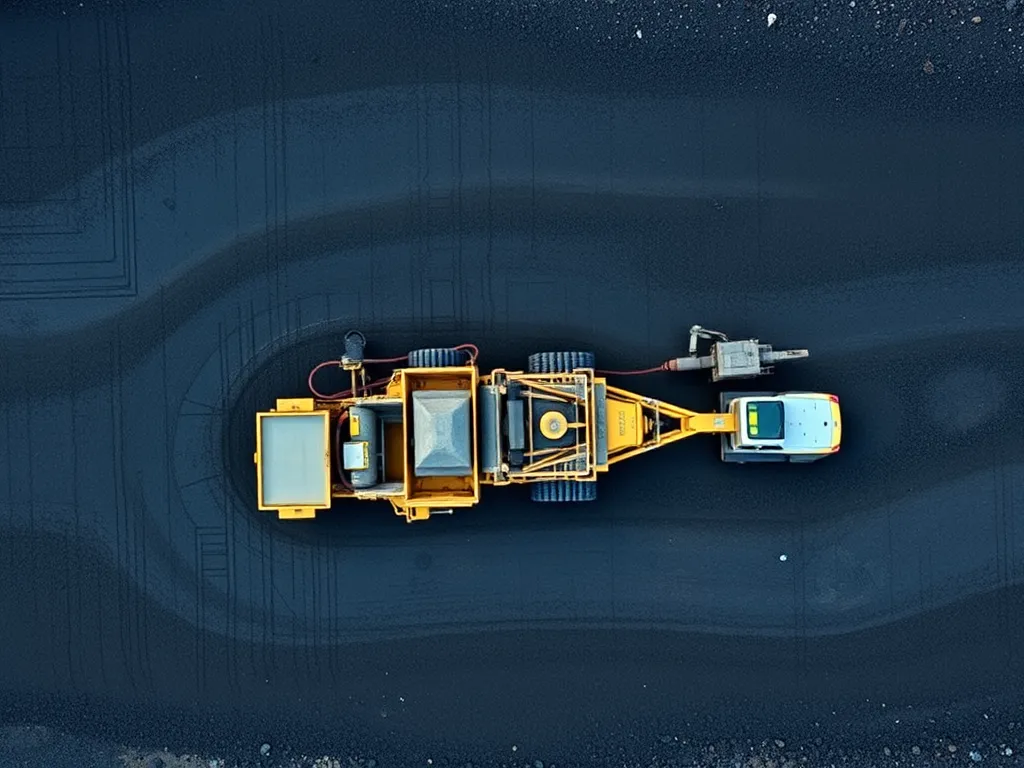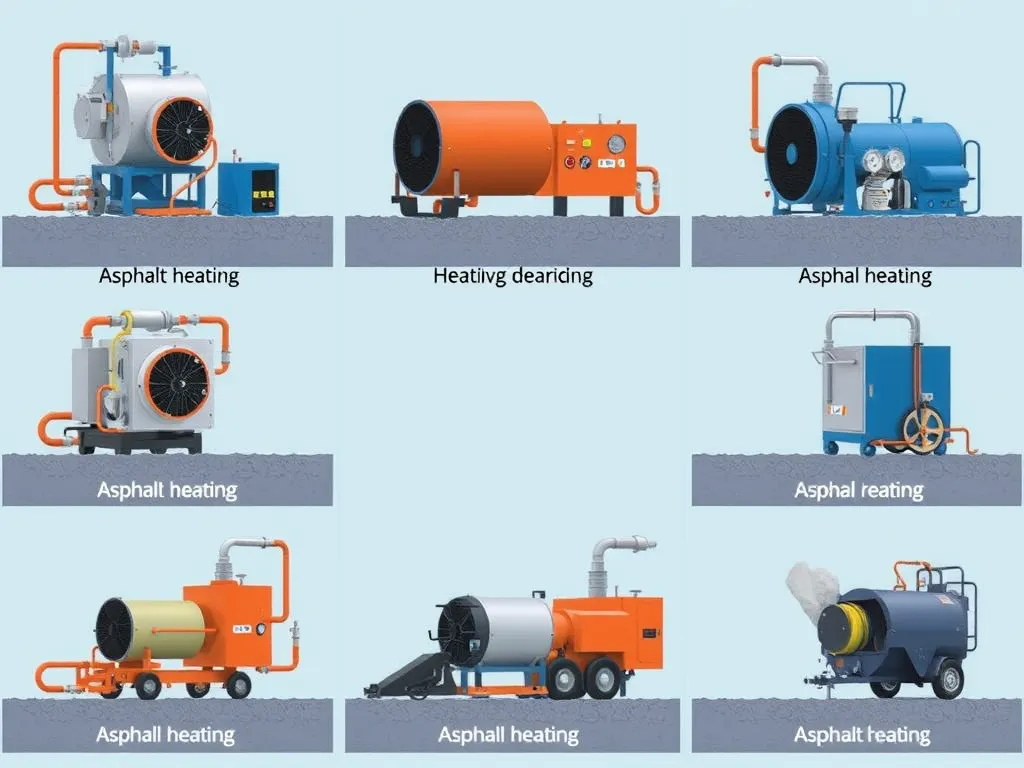Estimating Costs for Asphalt Projects: What You Need to Know
Published on: April 20, 2025 | Last Updated: April 14, 2025
Written By: George Voss
Estimating costs for asphalt projects means calculating material, labor, equipment, and site preparation expenses. Prices depend on project size (driveway vs. highway), geographic location, and asphalt thickness (2-4 inches typical). Current asphalt prices range $100-$200 per ton, with installation adding $3-$5 per square foot. Accurate estimates let you compare contractor bids, spot savings like recycled asphalt (cuts costs 20-30%), and plan for seasonal price changes.
This guide breaks down cost components like delivery fees ($10-$15 per ton) and sealcoating ($0.15-$0.25 per sq ft). Learn how to measure your project area, calculate tons needed (length x width x depth x 145 lbs/cubic foot), and adjust for challenges like poor drainage or tight deadlines. We cover residential driveways (20×20 costs $1,200-$2,500), commercial lots, and large-scale paving, plus tools to avoid common budgeting errors.
Contents
- Components Of Asphalt Project Costs
- How to Calculate Asphalt Paving Costs
- Key Factors Impacting Asphalt Budget Estimation
- Cost Breakdown by Project Type
- Common Mistakes in Asphalt Cost Estimation
- Budget Planning and Cost-saving Strategies
- Tools for Accurate Asphalt Cost Estimation
- Environmental and Regulatory Considerations
- FAQ: Asphalt Cost Estimation
- Closing Thoughts
- Useful References for You:
Components Of Asphalt Project Costs
Breaking down asphalt project budgets requires analyzing five core cost categories. Each impacts your final estimate differently based on project scale, location, and design specs.
Material Costs (Asphalt Pricing Per Ton)
Hot mix asphalt (HMA) prices range $80-$160 per ton. Factors like PG binder grades (performance-graded asphalt cement) and Superpave mix designs affect rates. Recycled asphalt (RAP) costs 30% less but requires testing for compatibility. Current oil prices swing material costs ±12% monthly.
Labor and Equipment Expenses
Paving crews charge $45-$75/hour per operator. Equipment rentals add $200-$500/day for pavers, rollers, and milling machines. Complex jobs needing GPS grading or infrared patching increase labor hours by 15-20%.
Site Preparation and Paving Costs
Base preparation runs $1.50-$4.50/sq ft. Includes grading, compacting 6″ granular subbase, and installing drainage systems. Asphalt placement adds $2-$5/sq ft for 2-4 inch lifts. Steep slopes or poor soil conditions boost earthwork costs by 40%.
Delivery and Traffic Management Fees
Transportation adds $15-$30/ton for asphalt trucks within 50 miles. Long hauls incur $1.25/mile fuel surcharges. Urban projects often require $800-$2,500 for traffic control plans, flaggers, and lane closure permits.
Sealcoating and Maintenance Expenses
Sealcoating costs $0.15-$0.25/sq ft every 3-5 years. Crack sealing adds $0.50-$1.50/linear foot. Include 10-15% of initial paving costs in long-term budgets for surface rejuvenators and pothole repairs.
With these components quantified, the next step involves precise calculations using industry-standard measurement methods.
How to Calculate Asphalt Paving Costs
Accurate cost estimation starts with structured math. Break down every variable, from surface area to seasonal pricing shifts.
Step 1: Measure Project Area (Square Feet)
Multiply length by width to get square footage. For irregular shapes, split into rectangles. A 20×50 ft driveway equals 1,000 sq ft. Laser measuring tools cut errors by 3-5% versus manual tape measures.
Step 2: Determine Required Thickness and Tons Of Asphalt
Residential driveways need 2-3 inches. Commercial lots require 4-6 inches. Convert inches to feet (3” = 0.25 ft). Multiply area (sq ft) by thickness (ft) for cubic feet. Asphalt weighs 145 lbs/cubic foot. Tons = (cubic feet × 145) ÷ 2,000. A 1,000 sq ft driveway at 3” depth needs 1,000 × 0.25 × 145 ÷ 2,000 = 18.1 tons.
Step 3: Calculate Material Costs Based on Current Asphalt Prices
Hot mix asphalt (HMA) costs $100-$200 per ton. PG 64-22 binder grades work for most climates. Multiply tons by local price. Add $10-$30/ton for polymer-modified mixes. Crude oil prices swing material costs ±15% annually. Mid-2024 averages: $125/ton Northeast, $110/ton Midwest.
Step 4: Add Labor, Equipment, and Additional Service Fees
Skilled crews charge $45-$75/hour. Paving 1,000 sq ft takes 6-8 hours. Include $200/day for rollers, $400/day for pavers. Permits range from $75 (residential) to $1,500+ (commercial). Traffic control adds $500-$2,000 for cones, flaggers, detour signs.
Step 5: Include Contingencies for Seasonal Demand or Complexity
Summer paving premiums add 8-12%. Allocate 10-15% buffer for drainage issues, soft subgrades, or tight access. Curved driveways cost 20% more than straight layouts. Repaving over concrete? Add $2-$4/sq ft for demolition.
With these numbers mapped, you’re ready to evaluate what drives budget variance. Next, we’ll explore how geographic factors and design specs amplify or reduce expenses.
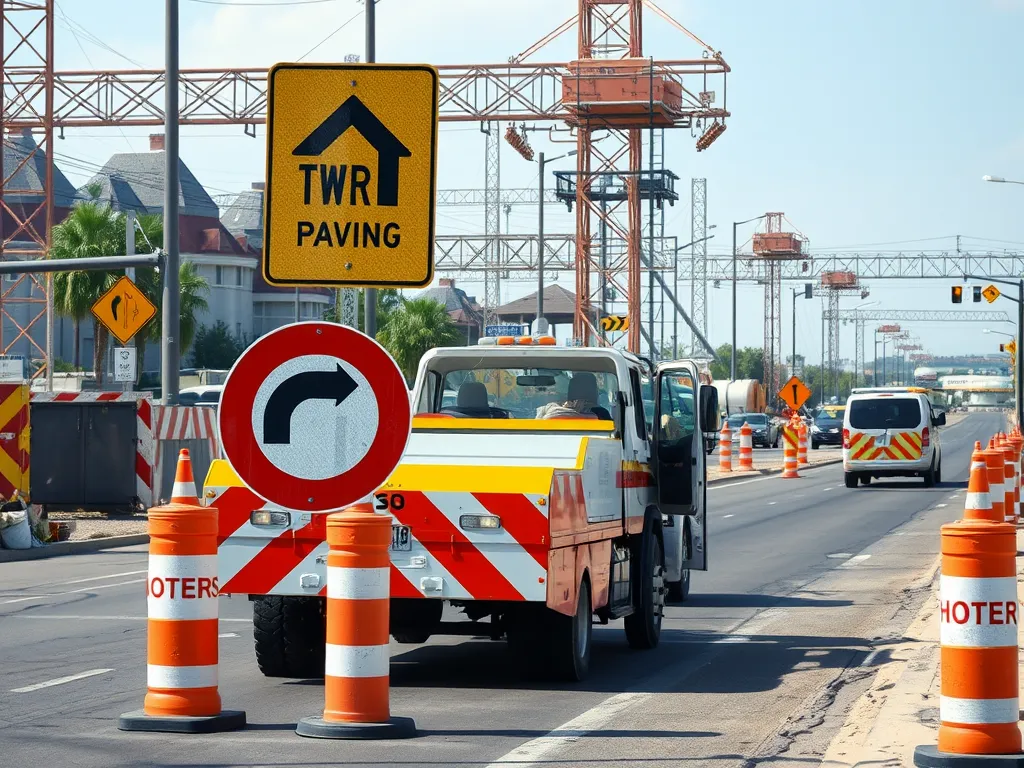
Key Factors Impacting Asphalt Budget Estimation
Accurate cost forecasting for asphalt work demands analysis of variables affecting material needs, labor hours, and equipment deployment. Let’s break down the top five elements shaping your asphalt project budget.
Project Size and Accessibility
Larger projects typically lower per-square-foot costs through bulk material discounts. But cramped urban sites or properties with steep slopes often require specialized equipment like mini-pavers, adding 15-30% to labor rates. Limited access also slows workflow – crews might complete 3,000 sq ft/day on open terrain versus 1,500 sq ft/day in tight spaces.
| Project Size | Typical Cost Range |
|---|---|
| Driveway (600 sq ft) | $3,800-$6,200 |
| Parking Lot (10,000 sq ft) | $43,000-$72,000 |
Geographic Location and Material Delivery Mileage
Asphalt prices swing regionally due to crude oil markets and aggregate availability. Midwest projects average $80-$110/ton for hot-mix asphalt, while West Coast jobs often hit $130-$160/ton. Every mile beyond a 50-mile delivery radius tacks on $2.50-$4.00/ton for trucking fees.
| Region | Avg. Asphalt Price/Ton |
|---|---|
| Northeast | $105-$135 |
| South Central | $85-$115 |
Surface Thickness Requirements
Pavement thickness directly dictates material needs. Residential driveways use 2-3” bases, while commercial lots need 4-6” for heavy vehicles. Calculate tonnage with this formula: (Area (sq ft) × Thickness (inches) × 145 lb/ft³) ÷ 2000 = Tons required. A 1,000 sq ft area at 3” depth needs ~18 tons.
Site Preparation Complexity (Grading, Drainage)
Unstable subgrades or poor drainage can balloon costs. Projects needing full-depth reclamation (mixing existing base materials) add $1.50-$3.00/sq ft. Drainage systems like French pipes or catch basins cost $15-$45/linear foot.
| Prep Task | Cost per Sq Ft |
|---|---|
| Basic Grading | $0.30-$0.60 |
| Full Excavation | $2.00-$4.50 |
Traffic Control or Permit Needs
Urban projects often require lane closure permits ($200-$800/day) and flaggers ($45-$75/hour). Highway work might need crash cushions or detour signage, adding $1,200-$5,000 to total fees. Always check local DOT regulations – some cities mandate 10% budget allocations for traffic management.
With these variables mapped, let’s examine how costs distribute across different paving scenarios – from residential driveways to interstate highways.
Also See: Importance Of Regular Driveway Inspections
Cost Breakdown by Project Type
Asphalt costs shift significantly based on project scope. From small driveways to multi-lane highways, knowing category-specific pricing patterns aids budget planning.
Residential Asphalt Driveway Installation
A typical single-family home driveway spans 400-800 square feet. Thickness ranges from 2″ for light traffic to 3″ for heavy trucks.
Average Cost for a 20×20 Driveway
A 20×20 (400 sq.ft.) installation runs $3,800-$5,600. Hot mix asphalt (HMA) at 3″ depth needs 11-13 tons. Current asphalt prices sit at $85-$110 per ton. Labor adds $2-$4 per square foot.
| Item | Cost Range |
|---|---|
| Materials (12 tons) | $1,020-$1,320 |
| Installation Labor | $800-$1,600 |
| Compaction/Grading | $300-$500 |
Commercial Parking Lot Paving
Parking lots demand thicker bases (4″-6″) and polymer-modified binders. ADA compliance, striping, and stormwater systems add to budgets.
Cost per 1,000 Square Feet Case Study
A 2023 Ohio lot rebuild totaled $48,750 for 15,000 sq.ft. ($3.25/sq.ft.). Breakdown:
| Phase | Cost per 1K Sq.Ft |
|---|---|
| Subgrade prep | $400 |
| 6″ Aggregate Base | $1,100 |
| PG 76-22 Asphalt | $1,450 |
| Striping/Lights | $300 |
Roadway and Highway Asphalt Projects
Interstate jobs use PG 64-22 binders and 8″-12″ structural sections. State DOT specs often mandate 5% RAP (recycled asphalt pavement) inclusion.
Per lane-mile (12′ width), urban highway paving hits $130K-$180K. Includes milling, traffic shifts, and density testing. Agencies like Caltrans bid tonnage contracts at $82-$105 per ton with long-term warranties.
With category benchmarks set, focus shifts to frequent budget pitfalls – starting with labor gaps during peak paving months.
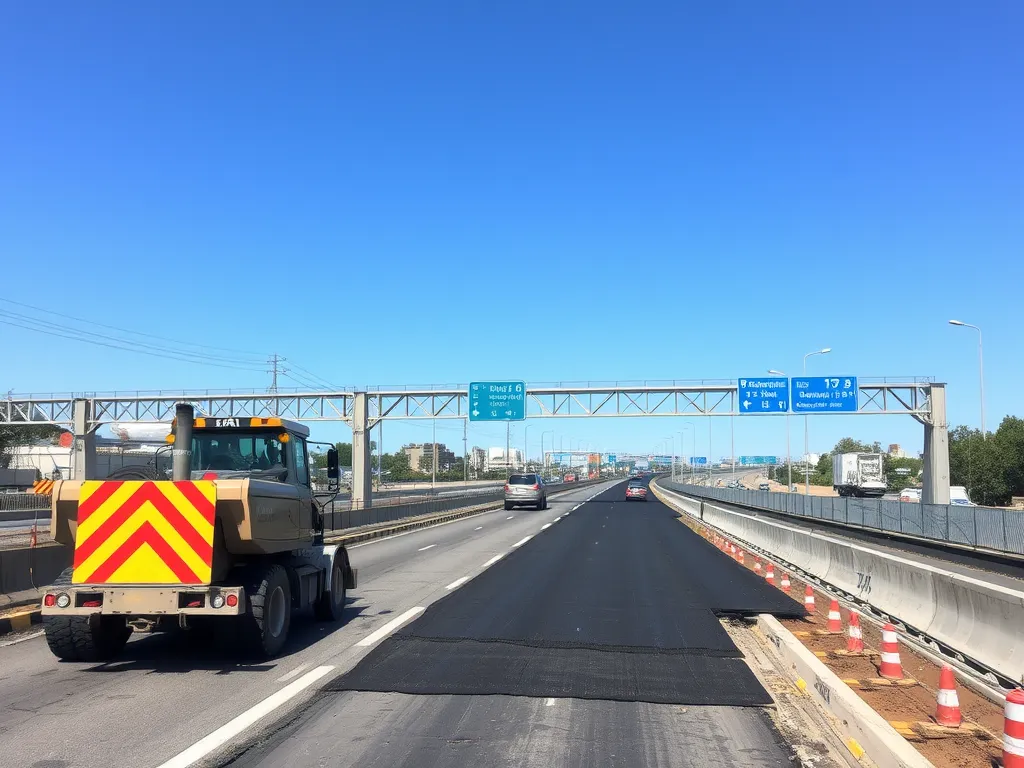
Common Mistakes in Asphalt Cost Estimation
Even detailed asphalt cost estimation can derail from hidden errors. Three frequent blunders lead to budget overruns exceeding 15% in residential and commercial projects.
Underestimating Labor Availability and Rates
Labor accounts for 30-40% of asphalt installation costs. Seasonal demand spikes in summer push hourly wages from $45 to $70 for skilled crews. Rural projects face 22% higher fees due to travel surcharges. Always verify crew availability timelines – delays from labor shortages add $150-$300 daily to project costs.
Ignoring Site Preparation or Debris Removal Costs
Site prep consumes 18-25% of paving budgets. Grading uneven terrain costs $1.50-$3.00 per square foot. Removing concrete debris adds $120-$200 per ton. Projects requiring soil stabilization spend $8-$12 per square yard before asphalt touches the ground. These steps aren’t optional – skipping them risks pavement failure within 12 months.
Failing to Account for Asphalt Price Fluctuations
Bitumen prices track petroleum markets, causing asphalt costs per ton to swing $8-$15 monthly. A 10,000-square-foot driveway needing 150 tons could see $1,200-$2,250 price shifts in 60 days. Contractors locking in rates via bulk agreements save 9-14%. Always include a 7% price buffer in asphalt budget estimation for 3-6 month projects.
Avoiding these pitfalls creates a stronger foundation for your financial plan. Next, explore proven strategies to optimize your asphalt project budget while maintaining quality standards.
Budget Planning and Cost-saving Strategies
Effective budget planning turns volatile variables into controlled factors. Strategic decisions during the estimating phase directly influence project viability. Let’s explore methods to optimize spending without cutting corners.
Comparing Quotes for Asphalt Work
Get bids from three or more contractors. Scrutinize inclusions: Does the quote specify PG 64-22 binder or generic “hot mix”? Verify unit pricing for materials ($110-$160 per ton) versus labor ($45-$75 per hour). Regional disparities matter—Midwest crews might charge 12% less than Northeast teams. Cross-check square footage calculations against your own tonnage estimates using the formula: (Area x Thickness x 145)/2,000.
Phasing Large Projects to Manage Cash Flow
Break multi-acre jobs into sequenced phases. Complete milling in Q1, base layer paving in Q2, then final surfacing in Q3. This spreads payments over fiscal periods, easing liquidity strain. Municipalities often use this method for roadway projects exceeding $500k. Contractors might offer volume discounts for phased work since equipment stays mobilized longer.
Preventive Maintenance to Reduce Long-term Costs
Sealcoating every 3-5 years adds 15+ years to pavement life. Crack filling within 6 months of formation prevents water infiltration costing $4-$6 per linear foot versus $25+ for subbase repairs later. Infrared patching addresses localized failures at 40% less than full-depth replacements. Budget $0.15-$0.35 per square foot yearly for proactive care—far below the $2-$4 per square foot for reconstruction.
Smart planning bridges initial outlays with future savings. Next, let’s examine digital solutions that bring precision to your asphalt cost estimation process.
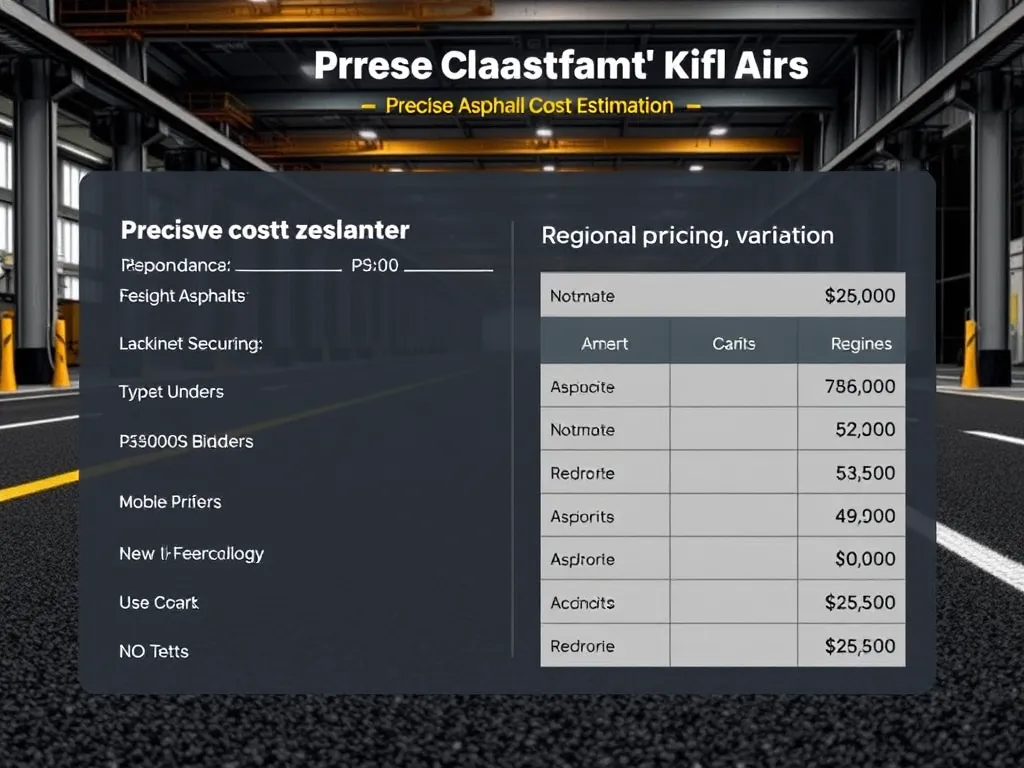
Tools for Accurate Asphalt Cost Estimation
Precision starts with the right resources. Modern tools remove guesswork from asphalt budget estimation, letting contractors and property owners forecast expenses within 5-10% accuracy.
Asphalt Tonnage Calculators
Free web-based tools like the Asphalt Institute’s calculator convert square footage to tons. Enter project length, width, depth (typically 2-3 inches for driveways), and compaction factor (12-15% for base layers). Outputs align with asphalt’s density of 145 lbs/cubic foot. Example: A 1,200 sq ft driveway at 3” depth needs ~16 tons of hot mix asphalt (HMA) at current asphalt prices of $120–$160/ton.
- Key inputs: Area, lift thickness, aggregate type (e.g., PG 64-22 binder vs. Superpave mixes)
- Adjust for regional yield variations – Midwest mixes differ from Gulf Coast formulations
Pricing Guides Per Square Foot
Annual guides from RSMeans or National Asphalt Pavement Association provide localized benchmarks. Commercial paving averages $3.50–$7.50/sq ft (materials, labor, grading). Residential driveways range $4–$8/sq ft. These guides factor:
- Fuel surcharges ($0.50–$1.25/ton for delivery beyond 50 miles)
- Labor rates ($45–$75/hour for asphalt crews)
- Equipment rentals ($300/day for compactors)
Industry-specific Estimating Software
Platforms like HCSS HeavyBid or B2W Estimate automate takeoffs and cost modeling. Features include real-time asphalt price feeds ($/ton updates from local plants), crew productivity rates (tons laid per hour), and change order tracking. Contractors report 20% faster bid preparation and 7% tighter margin control versus manual methods.
- Integrate GPS earthwork data for precise grading cost estimates
- Flag areas needing extra drainage stone or geotextile fabric
While these tools sharpen forecasts, material choices and environmental factors still sway final asphalt project costs. Recycled asphalt pavement (RAP) at 15–30% mix ratios can cut material bills…
Environmental and Regulatory Considerations
Managing an asphalt project budget demands attention to rules shaping material use and site operations. Ignoring these factors can add 5-15% to total asphalt installation costs through fines or rework.
Recycling Existing Asphalt Materials
Using Reclaimed Asphalt Pavement (RAP) cuts asphalt pricing by 20-30%. Milling old surfaces yields material for new bases or mixes. Contractors factor in milling costs ($2-$5 per square foot) against virgin aggregate savings. Testing fees apply—RAP must meet gradation specs to avoid weak layers. Hot-in-place recycling can lower paving asphalt cost by $1.50-$3 per square foot for roads needing partial depth fixes.
Local Environmental Compliance Costs
Air quality rules impact asphalt costs through permits ($500-$2,000) and emission controls. Stormwater management adds $0.50-$1.50 per square foot for silt fences or retention basins. Some regions require low-VOC binders, lifting material prices 8-12%. Budget $3,000-$7,000 for soil stabilization if paving near wetlands. Non-compliance fines hit $37,500 daily under the Clean Water Act.
Factoring in these variables sharpens asphalt budget estimation accuracy. For clarity on typical line items, review common queries in the FAQ section next.
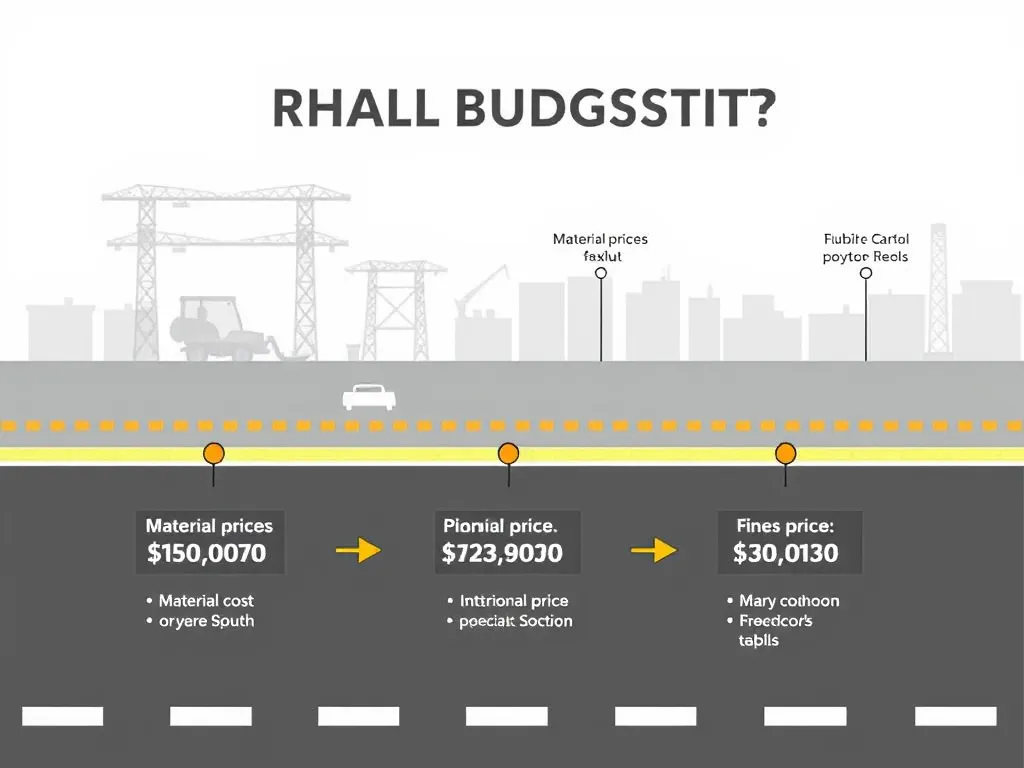
FAQ: Asphalt Cost Estimation
How Do You Estimate the Cost Of an Asphalt Job?
Estimating the cost of an asphalt job involves several steps, including calculating the area to be paved, determining the required asphalt thickness, calculating the amount of asphalt needed, and accounting for labor and additional service fees. It’s essential to gather quotes from multiple contractors to understand the local pricing and get an accurate estimate.
What is the Cost to Pave 1,000 Square Feet Of Asphalt?
The cost to pave 1,000 square feet of asphalt typically ranges from $3,000 to $7,000, depending on several factors such as the thickness of the asphalt, labor rates, and the geographic location of the project. This estimate includes both materials and installation costs.
How Much Does a 20×20 Asphalt Driveway Cost?
A 20×20 (400 square feet) asphalt driveway costs between $3,800 and $5,600, depending on local asphalt prices, labor costs, and installation specifics. This price range generally accounts for materials like hot mix asphalt and preparation work required prior to paving.
How to Factor in Lay Down Prices and Installation Fees?
When estimating costs, it’s important to include lay down prices, which cover the charges for the application of asphalt, and installation fees, which encompass the labor costs associated with the paving. Be sure to consider regional price variations and the complexity of the job, as these factors can influence overall pricing significantly.
Closing Thoughts
Estimating costs for asphalt projects involves multiple factors, including material pricing, labor, and site preparation. Accurate budgeting is key to project success, ensuring you get quality work without overspending. Keep in mind the common pitfalls like underestimating labor or ignoring price fluctuations.
Utilize the tools mentioned earlier, such as asphalt tonnage calculators and pricing guides, to aid in your cost estimation. Preventive maintenance and comparing quotes can also save you money in the long run.
For more insight and resources on asphalt cost estimation, visit Asphalt Calculator USA.
Useful References for You:
- Lavin, P. (2003). Asphalt Pavements: A Practical Guide to Design, Production, and Maintenance for Engineers and Architects. London: Taylor & Francis.
- Paving and Asphalt Calculator – DRYCO
- Pricing Calculator | Asphalt & Concrete Projects | Instant Estimate | Call for an Official Estimate
- Asphalt Calculator – Estimate Blacktop Tonnage – Inch Calculator
- Asphalt Driveway Construction Cost Estimator – Estimate Florida Consulting

